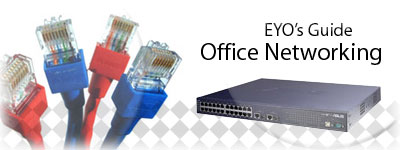EYO's Guide to Office Networking
(The copyrights© of all EYO Feature Articles are the property of Eyo Technologies Pty Ltd. Reproducing without permission is prohibited.)

EYO’s Guide OfficeNetworking
It’s impossible to underestimate the importance of business communications. No matter what size business or whether you’re collaborating with clients or staff, the ability to send and receive information reliably is critical.
The complexity of an office network is obviously going to be vary depending on the size and layout of the business, the number of computers, server and users. However, irrespective of any of these factors, the various hardware components which make up your office network have to be 100% reliable, and shouldn’t make life difficult for the network administrators to configure and manage.
The backbone of any office network is the core switch. This should always be a step up from the standard home networking switches. Core switches should exist in their own right on the network, with a local IP address and management features. They should support networking technologies like VLANs and Layer-2 (MAC address) management, have high-speed fibre and/or ethernet ports for connectivity with other networking devices, and finally they should be rack-mountable, for secure storage in a server rack. The ASUS M-GX2048 is a great example of an excellent core switch for any type of network.
To avoid the expense of hardwired network points, many office environments make strong use of wireless networking technologies. Offices are much less likely to use wireless router appliances, preferring the security of wireless access points connected to the wired ethernet network. In these cases, a good business AP should be compatible with wireless encryption and authentication protocols, as businesses are far more actively concerned with protecting network traffic. Devices like the D-Link DWL-2100AP offer high-bandwidth 108Mbps connectivity along with WPA and 802.1x authentication and SNMP management. Laptop clients usually have wireless adaptors in-built, but for those that don’t then the D-Link DWL-G650 PCMCIA card offer good, high-speed wireless connectivity, whereas desktops need something like the D-Link DWL-G520 PCI adaptor.
Smaller offices wishing to have the advantage of network printing without going to the expense of purchasing network-capable printers should look at stand-alone print servers. These useful devices effectively share out any locally attached printer on the network, making it available to other clients. The client machines still need to have the relevant drivers installed locally, but the print jobs are sent across the network and processed by the print server. Devices like The D-Link DPR-1260 let you share out up to four USB 2.0 printers. The server itself communicates via standard RJ-45 or wireless ethernet, offers the full range of wireless security protocols to prevent print jobs being snooped on, and can be remotely managed.
VPN (Virtual Private Network) is a great way for your remote users to securely connect into the business network from an external location, without having to put up with painfully slow dialup modem connections. A VPN lets a remote user connect exactly as if they were sat plugged into the office network, with full access to all services and resources. Most server products offer a software VPN solution, but if you don’t want to increase server load or would prefer to avoid exposing your servers directly to outside networks, then a dedicated hardware VPN device is preferable. The Netgear FVS-318 is such a device, allowing up to eight simultaneous VPN connections, along with a full-featured firewall and VPN passthrough. If you need to support more remote users, then the Netgear SSL312 is a good choice – it supports up to 25 simultaneous connections and can authenticate remote users against a centralised security authority like Active Directory. VPNs can also be used to create a virtual WAN connection between offices – an inexpensive way to get multiple locations connected.
EYO feature article write ups: Tell us a topic your interested in and we'll write about it!
EYO Technologies is asking you our valued customers to submit a technology or product related topic you would like us to write about and publish in our website. If you'd like to see a particular topic feature on any trends, technological advancement in computers or just want to learn more about a product then do let us know! Our friendly staff will look into your suggestion and if we think it would be useful we will write about it to be published on our homepage.
Simply email your suggested topic to:
Check out the past articles we have explored for our customers:

 Kingston Tool
Kingston Tool

